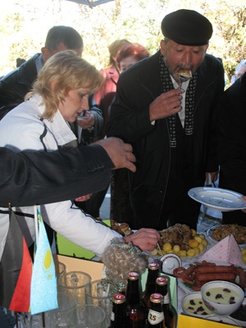Identity and integration of Germans in Kazakhstan
German Identities in Kazakhstan
The process of identity formation is also shaped by two other factors: the work of local institutions and social networks. The situation of the German minority has been deeply affected by the out-migration of the vast majority of Kazakhstani Germans to Germany. Those who stayed behind express feelings of abandonment, but at the same time they do profit from their relations to relatives and friends in Germany. The fact, that the vast majority of Kazakhstani Germans emigrated, allowed not only for the establishment of transnational networks but also implies changing local networks for those who remained in Kazakhstan.

Moreover, the work of German institutions and their impact on the local level has to be considered. In 1989, political activists founded the organisation Wiedergeburt (ger. “rebirth”) as an institution for the German minority in the Soviet Union. Today, the main activities of Wiedergeburt in Kazakhstan are directed towards the maintenance and development of the German minority. German language courses play a crucial role in this.
The above-mentioned aspects regarding state policies, social networks and activities of local institutions all pertain to the process of negotiating identities in day-to-day life. How people identify themselves in relation to others is furthermore constrained by emotional attachments to certain identities as a result of socialisation and life experience. Furthermore, postulated identities must – at least to a certain extent – fit into the prevailing categorisations in order to be able to represent them plausibly.
The following questions are at the core of my research:
- When, how and why do people identify themselves as German? What does ‘Germanness’ mean, and how is it perceived by others?
- How do Kazakhs, Russians, Germans and others live together? When and how do they distinguish themselves from one another?
- What kind of other categories beyond ethnicity are there and when are they used?
References
Brown, Andrew J. 2005. The Germans of Germany and the Germans of Kazakhstan: A Eurasian Volk in the Twilight of Diaspora. Europe-Asia Studies, Vol. 57, No. 4, June 2005, pp. 625-634.
Brubaker, Rogers. 1999. Nationalism Reframed. Nationhood and the national question in the New Europe. Cambridge University Press.
Cummings, Sally N. 2006. Legitimation and Identification in Kazakhstan. Nationalism and Ethnic Politics, 12, 2006, pp. 177-204.
Diener, Alexander C. 2004. Homeland conceptions and ethnic integration among Kazakhstan’s Germans and Koreans. New York (et al.). The Edwin Mellen Press.
Holm-Hansen, Jorn. 1999. Political Integration in Kazakhstan. In: Kolsto, Pal (ed.). Nation-Building and Ethnic Integration in Post-Soviet Societies. An Investigation of Latvia and Kazakhstan. Boulder: Westview Press, pp. 153-226.
